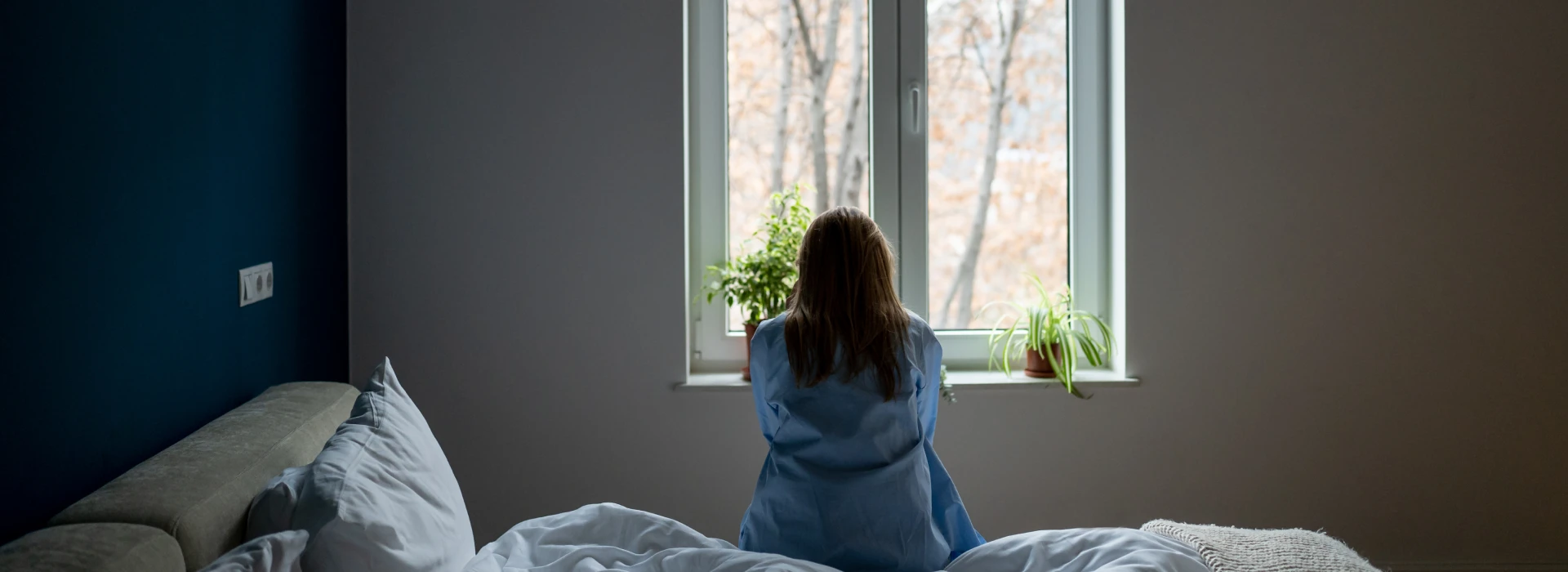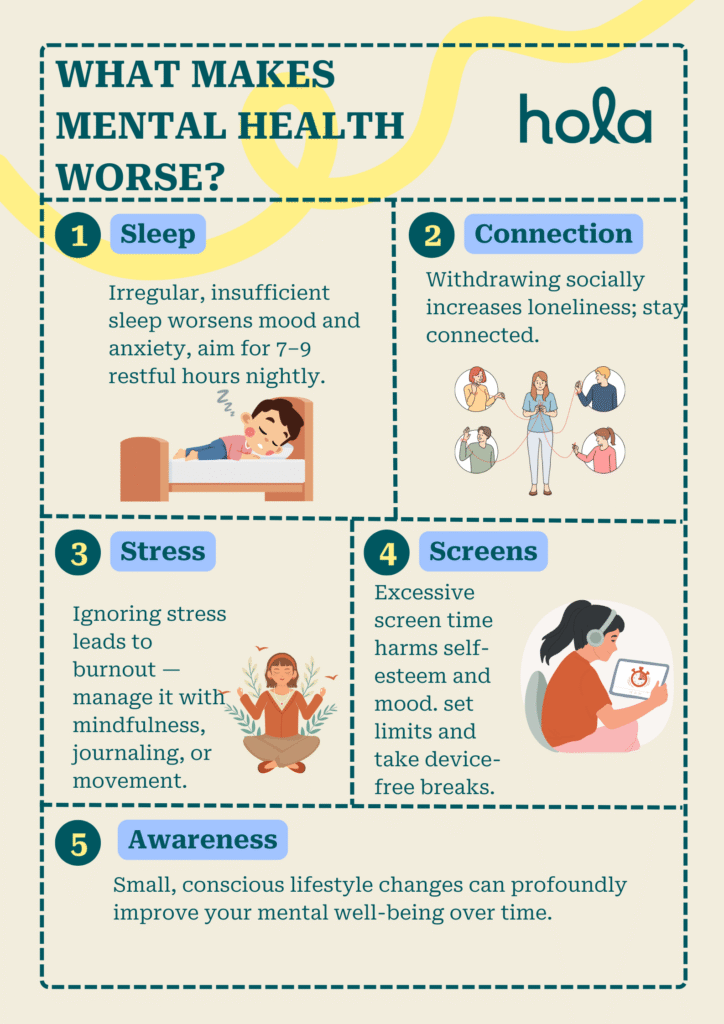Worst habits for your mental health & what you can do about them
Written by editorial staff writer at Hola. Medically reviewed by Amira Shah, MA in Counselling Psychology, Registered Psychotherapist.

Contents

Summary: Bad habits like overthinking, lack of sleep, and excessive social media use can affect your mental health. Identifying and substituting them with healthier routines like mindfulness, adequate sleep, and self-compassion can significantly improve mental well-being. Minor adjustments can lead to stronger mental well-being.
Let’s be real—mental health doesn’t come with a manual, and most of us are doing our best to figure things out. But did you know that some everyday things we do might be silently messing with our minds? Think about it—have you ever mindlessly scrolled late at night, skipped meals, or obsessed over a text for hours? Yes, we’ve all been guilty. These habits might seem harmless, but over time, they can significantly impact your emotional well-being. The upside? You have the power to change them. Let’s delve into some of the worst habits for your mental health and how to show them the exit door.
How do daily habits impact mental health?
Daily habits significantly impact our mental health. Positive habits, such as consistent physical activity, proper sleep, balanced nutrition, and mindfulness, can lift our mood, ease stress, and improve emotional regulation. Conversely, negative habits like insufficient sleep, chronic stress, excessive screen time, and critical self-talk can contribute to anxiety, depression, and burnout. Essentially, what we do every day affects how we feel, think, and handle life’s challenges.Also read: What are signs of extreme stress and what to do?
Ready for positive change? Start your mental health care plan here.
What can make your mental health worse?
Certain habits and lifestyle choices can gradually impair mental health, often without immediate awareness. Recognising and replacing these habits can improve emotional well-being noticeably.- Inconsistent sleep patterns: Insufficient and irregular sleep can exacerbate anxiety, depression, and mood fluctuations. Strive for 7–9 hours of quality sleep each night with a consistent bedtime routine.
- Social withdrawal: Stepping back from social interactions can intensify feelings of loneliness and despair. Consider reaching out to a friend or a support group, even online, to maintain an social connection.
- Neglecting stress: Allowing stress to accumulate without healthy coping mechanisms can result in burnout. Instead of avoidance, adopt strategies such as mindfulness, journaling, or regular physical activity.
- Excessive screen time and social media use: Frequent scrolling can skew self-perception and provoke anxiety. Establish daily usage limits and take intentional breaks from devices.

When to seek help
It is vital to seek assistance when emotional difficulties start hindering your daily functioning. Indicators may include persistent sadness, anxiety, irritability, trouble sleeping, changes in appetite, loss of interest in activities, or withdrawing from social connections. If you find it hard to manage, feel overwhelmed, or notice a drop in work or academic performance, these are strong signals that you might benefit from professional help.Don’t wait for issues to escalate, early intervention can lead to better outcomes and help you feel more like your true self again.
Also read: How to deal with negative thoughts: Trusted guide by therapists
How can a mental health care plan help?
A mental health care plan is a structured approach created by your GP to support your emotional well-being. It outlines your mental health requirements needs, treatment goals, and the services or support you may need, such as counselling, therapy, or referrals to specialists. It can also make mental health services more affordable, as Medicare or insurance frequently often covers a portion of the expense costs.
A care plan ensures consistent, tailored support, helping you stay focused on your mental health goals.
Your mind is your constant companion—so why not make peace with it? Replacing a few toxic habits won’t solve everything instantly, but it’s a strong step toward a happier, healthier you. Small tweaks can make a big difference. You’ve got this!
Take control of your mental health. Begin your care plan now.
What we treat
- Cough
- Nausea & vomiting
- Fever
- Hayfever
- Fatigue
- Sore throat
- Acne
- Hair loss
- Gout
- Eczema
- Rosacea
- Sunburn
- UTI
- Erectile dysfunction
- Contraception
- Morning sickness
- Morning after pill
- Prostate health
- Anxiety
- Depression
- Stress
- Grief & loss
- Antidepressants
- Premature ejaculation
- Asthma
- Blood pressure
- Blood thinners
- Diabetes
- Cholesterol
- Migraines & headaches
- Allergies
- Body ache
- Heartburn & reflux
- Sleep disorder
- Pain relief
- Gastro
Related Articles
Disclaimer
This blog is for general informational purposes only and does not indicate that Hola Health provides all treatments or preventive measures mentioned. It is not intended to be a substitute for professional medical advice. Always seek the guidance of your doctor or other qualified health professional with any questions you may have regarding your health or a medical condition. For emergencies please immediately contact 000. Any medical topics discussed are intended to educate, not to imply availability through Hola Health.

Get affordable healthcare on your terms, with quick access to qualified, Australian-registered telehealth doctors & health practitioners, 24/7, 365 days a year. No more searching for ‘doctors near me‘ – Hola connects you instantly.
Address: 79 St Georges Terrace, Perth WA 6000


Hola Health App
Get affordable healthcare on your terms, with quick access to qualified, Australian-registered telehealth doctors & health practitioners, 24/7, 365 days a year. No more searching for ‘doctors near me‘ – Hola connects you instantly.
Call 000 for emergency or urgent medical help.
Address: 79 St Georges Terrace, Perth WA 6000
© Hola Health, a brand of Packapill Pvt Ltd


 Facebook
Facebook  X
X  Copy Link
Copy Link











